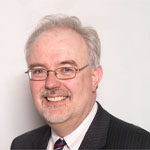William G. Powderly, MD, will lead global health initiatives as a newly appointed deputy director of Washington University’s Institute of Public Health. He also will serve as co-director of the Division of Infectious Diseases in the Department of Medicine at the School of Medicine.
Powderly, a highly regarded specialist in infectious diseases, has a long history with Washington University. He started his career at the School of Medicine in the 1980s and later served as co-director of the Division of Infectious Diseases and director of the AIDS Clinical Trials Unit.

In 2004, Powderly returned to his native Ireland, becoming head of the Department of Medicine at University College Dublin School of Medicine. He was named dean of that medical school in 2005, and during his tenure there, Powderly has greatly expanded the medical school’s international activities, especially in Malaysia and China.
In coming back to Washington University, Powderly also will hold an endowed chair, the J. William Campbell Professorship, and lead the clinical activities of the infectious diseases faculty and fellows. His new appointments are effective Jan. 1, 2013.
“Bill Powderly is an extraordinary clinical investigator, physician and teacher,” says Victoria Fraser, MD, the Adolphus Busch Professor of Medicine and head of the Department of Medicine. “He has tremendous experience in clinical trials for HIV and is well known for his ability to mentor fellows and junior faculty into independent careers. Bill brings great leadership in infectious diseases and global health to Washington University, and I am pleased he is returning to St. Louis to expand our global health programs and lead the clinical activities in the Division of Infectious Diseases.”
Global health programs are a major component of the Institute of Public Health. The institute’s network of more than 160 faculty scholars across the university includes many who aim to reduce illness and improve the lives of millions of people in developing countries.
In early 2012, the institute launched an innovative program that provides seed funding to foster faculty collaborations that have the potential to solve pressing global health issues. With this funding, multi-disciplinary teams of investigators now are doing the groundwork to apply for larger research grants to study the characteristics of a highly lethal form of breast cancer in immigrants from west Africa; whether cleaner-burning indoor cook stoves can alleviate health problems in northwest India; and whether reducing tobacco use and the use of solid fuel for cooking can improve childhood mortality and reduce preterm births in Nepal.
“We are thrilled that Bill will lead the Institute of Public Health’s global health initiatives,” says institute director Edward Lawlor, PhD, the William E. Gordon Distinguished University Professor and dean of the Brown School. “Washington University has tremendous talent and interest in global health. Bill’s leadership and energy are a perfect fit to develop a distinctive program of public health research and education that builds on the strengths of our faculty.”
For more than 20 years, Powderly has been actively engaged in research to improve treatments for patients with HIV. His initial studies focused on evaluating drug cocktails to identify effective first-line treatment for HIV. He has also been involved in research to understand the long-term side effects of HIV medications, particularly metabolic problems like diabetes, lipid abnormalities and osteoporosis.
Powderly has served in a number of leadership roles in his field, including as vice chair of the U.S. AIDS Clinical Trials Group and chair of its scientific steering committee. He has been a member of numerous advisory groups on HIV and infectious diseases for the National Institutes of Health (NIH) and the U.S. Centers for Disease Control and Prevention. He also was the first chairman of the HIV Medicine Association.
Powderly is the author of more than 300 scientific journal articles and book chapters on HIV and AIDS. He also is a fellow of the Infectious Diseases Society of America, the Royal College of Physicians of Ireland, and the American Association for the Advancement of Science.
Washington University School of Medicine’s 2,100 employed and volunteer faculty physicians also are the medical staff of Barnes-Jewish and St. Louis Children’s hospitals. The School of Medicine is one of the leading medical research, teaching and patient care institutions in the nation, currently ranked sixth in the nation by U.S. News & World Report. Through its affiliations with Barnes-Jewish and St. Louis Children’s hospitals, the School of Medicine is linked to BJC HealthCare.